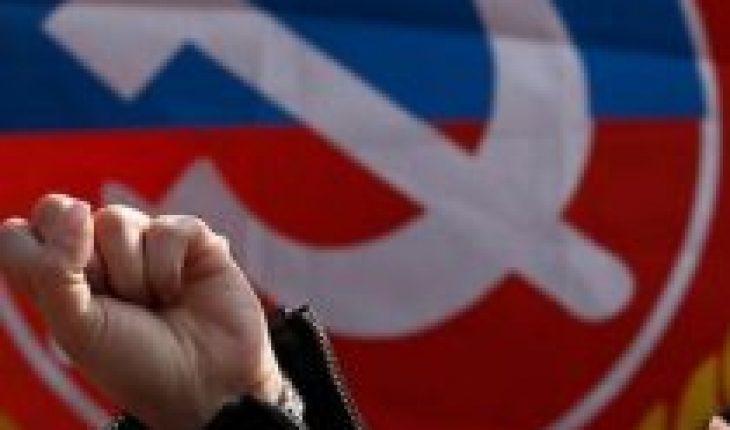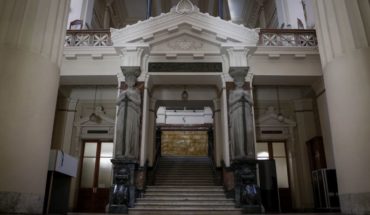
The same people who for a long time played to ignore the Communist Party, considering it a marginal actor of post-dictatorship Chilean politics, today reveal themselves for prosecuting it, demonizing it and even placing it to rectify its positions. In recent days at least three columns of that tenor have been published in El Mostrador, signed by Ignacio Walker (The Influence of Jadue in the Political Twist of the Communist Party, 25/12), Pablo Paniagua (Besieged and Ruleless Constitutional Convention, 25/12) and Eugenio Rivera Urrutia (PC Congress, Constitutional Convention and Democracy, 27/12), on the resolutions of the XXVI PC Congress and its consequences for the future election of the Constitutional Convention.
Walker, a former trainer and former chancellor, was, as is known, president of Christian Democracy (DC) at the time the New Majority was formed; Paniagua, meanwhile, is a “senior researcher” of the Foundation for Progress, which is defined as liberal, while Rivera is part of the Chile 21 Foundation, the “thought tank” linked to the Socialist Party (PS), the Party for Democracy (PPD) and that centrist culture called laguismo.
There has never been such concern on the part of the political sectors representing the three columnists for communist positions that are not really new, such as the choice for a policy of political and social unity with anti-neoliberalism as an axis, the decision to surround the Constitutional Convention with popular mobilization and the ratification of its ideological adheretion to Marxism-Leninism.
The analytical arrests developed from various angles by Walker and Rivera fail to conceal a political intentionality that, beyond legitimate and desirable criticism, aims to undermine the figure of Daniel Jadue as a presidency and at the same time blame the PC and its allies of Chile Digno for a possible failure of a single list of opposition for the election of the Constitutional Convention. Implicitly, and without any self-critical rigor, both columnists tend to place the so-called Constituent Unit as the only viable formula for opposition convergence.
Paniagua agrees with Walker and Rivera in rejecting the communist decision to give the Constitutional Convention in fact a character of Constituent Assembly through street pressure from social mobilization. This proposal not only scares the researcher of the Foundation for Progress, but stimulates him for a diatribe of demonization of the PC that speaks very badly of the purported liberal character of his organization and brings it closer to Macartism. Therefore, it is better to dispense with the next lines of this columnist and focus rather on the positions expressed by the other two authors.
Members of the Constituent Unit have been annoyed by the role that the PC has been reaching since 2011 Camila Vallejo legitimized himself in leading the struggle for university gratuitousness and questioning the higher education model imposed by the dictatorship. It annoys them that today the Communists are articulated an alliance with the Broad Front, which despite its internal crises and disaffections, remains an innovative benchmark in Chilean politics. Finally, they are annoyed that the Green Regionalist Party, born of D.C. divisions, is also part of Worthy Chile. They are annoyed by the existence of this conglomerate formed in the heat of the outburst or social rebellion that began on October 18, 2019. In the face of this new scenario, the Constituent Unit appears as the attempt of an old political class to recast the Concertation.
José Miguel Varas baptized in one of his works the communists as the tenacious. They may also be classified as obcecado. Its alliance policy has not changed substantively since the time of the Popular Front and neither has its democratic vocation in terms of its project for Chile. He was the main manager of the Popular Unity and after the 1973 coup lifted the proposal for an anti-phase front seeking unsuccessfully understandings with the DC while challenging the “ultra-left” and seeing the dispersion of the various fractions of a PS that was dyed social democracy.
The PC played against its scheme that sought to re-edit, in the early years of the dictatorship, the anti-fascist popular fronts prior to World War II. When the conditions for the anti-dictatorial unit began to be met since the 1980s, the PC opted for “the right to rebellion”, which marginalized it from the No Party Concertation, which would later be the Concertation for Democracy.
It was a kind of original sin of the communists and the parties of the Concertación made him pay dearly with the refusal to possible alliances that in the binominal system made them pay dearly enable access to Parliament. However, it was the communist and other votes of the extra-parliamentary left that staged the presidential election in favour of Ricardo Lagos and Michelle Bachelet in the run-off.
It was a comfortable scenario for concert parties, not only for having this zero-priced electoral reinforcement, but also because the exclusion of the more radical left facilitated the political call for consensus, which consolidated neoliberalism and allowed changes to the 1980 Constitution.
The elitistization of politics was undermining the social foundations that gave initial sustenment to the Concertation. THE DC, once a relevant protagonist in the student movement, ceased to have influence in the university federations, where the PS and PPD were also displaced by nascent groups of left-wing collectives. The Concertation also lost a presence in trade unions and even in some professional colleges.
Eduardo Frei Ruiz-Tagle’s defeat to Sebastián Piñera in the 2009 presidential election showed a wear and tear of the Concertación and enabled the PC to finally enter into an electoral and programmatic alliance with the center left, catapulted by the wide social convocation of the mobilizations for university gratuitousness and regional and environmental conflicts. Bachelet’s second government programme played many of the demands that would emerge in 2019 with the social outburst, from the end of the Pinochetist constitution and a real validity of human rights to fundamental changes in pension, health and other areas of socio-economic inequality that characterizes this country.
In the end, the most momentous conquest of Bachelet’s government was the end of the binominal system, while the new constitution was bogged down after an interesting participatory process through lobbying, to culminate, in the aftermath of his tenure, in a late and timid project sent to Parliament that the current government of Sebastian Piñera filed in the trunk of oblivions. The same was the case with the reform of the AFP system, which was relegated in the area of studies and commissions, not to mention the pathetic episode of the frustrated closure of the Punta Peuco penalty in the last hours of bacheletism.
There is much to be covered in the crisis of the New Majority project, but the key factor was the disaffection of an important sector of ex-Concertation that sabotaged programmatic objectives. Special mention in this regard for the right wing of the DC chaired by Ignacio Walker, more concerned with making differences with the PC regarding chavism in Venezuela than of driving transformations in Chile. Not a minor fact, as while the Communists were participating in the cabinet from modest ministries, DC controlled key positions in Interior and other key portfolios. In the retreat phase of programmatic momentum, Jorge Burgos en Interior was the paradigm of conservative management in struggle with social movements and indigenous peoples, while the socialist Rodrigo Valdés in the Treasury represented the consolidation of neoliberal policies.
A similar role played figures from the “party of order”, as he has called It The Counter. Sesudas columns by José Joaquín Brenner, Eugenio Tironi and the mercurial columnist Carlos Peña, all of them prone to laguism, adjusted nuts in favor of a moderation involving forgetting programmatic promises.
As the communists are tenacious and obscene, they remained to the end the most faithful adherents to Bachelet and the diluted Project of the New Majority. Because of its questioning nature to the government, pc president Guillermo Teillier denied support for the non-AFP Movement, which acquired a growing call, on the grounds that there were more urgent tasks than pension reform.
As DC broke the government alliance to attempt a sad “own path” in the last presidential and parliamentary terms, the PC ended up being the fundamental support of Alexander Guillier’s campaign. In the parliamentarians he rigorously respected his support pacts, although many of his militants had to be painlessly defrayed by the Socialist and former DC José Miguel Insulza in the senatorial of Tarapacá, while the undisciplined Socialists broke the agreement in Atacama and prevented the arrival in the Senate of the communist Lautaro Carmona.
The epitaph of the New Majority also went through the transversality of the Penta and SQM scandals, where corruption splashed equally to parties of the formerConcertation, pro and Chile Vamos. Both the PC and the Broad Front are safe from accusations in these episodes that increased disbelief and distrust of citizens in political parties.
Can it be surprising then that after the teachings and manipulative events of the social outburst, the PC opts for its current alliance policy in Worthy Chile turning its back on a former Concertation that always saw it as a marginal partner?
Since his anti-communist resentment Ignacio Walker describes as a “political turn” the agreements of the last Congress of the PC, in circumstances that they are strictly an effort of continuity of a permanent policy of confrontation with the right and the neoliberal model. In the purest style of a seasoned reporter, former DC president tells details of the communist congressional intern to introduce a Jadue who folded hands with tellier and Carmona’s old leadership to embark his party on a radicalized adventure.
Although the PC’s Central Committee ended up ratifying Tellier and Carmona in the cupular positions, we should rejoice in the renewal of leadership in their disciplined militancy, with high votes in favor of Camila Vallejo and Jadue himself. Continuity and renewal seems to be the sign, which Walker describes lightly as a twist from the trench of a Constituent Unit that has little to offer, beyond the desire to impose its terms for the long-awaited unitary list of opposition in the Constituent Convention.
Rivera, from Chile 21, worries that the PC does not renounce its Marxist-Leninist definition, without unsettling the ideological ambiguity of the Constituent Unity parties, marked above all by its lack of self-criticism of its work to strengthen neoliberalism, as Roberto Pizarro rightly pointed out in another column of El Mostrador (Social and Political Unit for constituent, 27/12).
It is not a good policy to discredit the adversary to support positions of their own incapable of defending themselves. The great fear of ex-certationists and the PRO is that Chile Digno’s alliance overcomes them in an election of delegates to the Constitutional Convention to three or more bands. If they want to avoid this, they have to renounce the privileges they intend to maintain as constituted parties and open the up to a real alliance with Worthy Chile that incorporates social movements from the vast world of independents.
They also have to come together, even if it bothers them, to recognize Daniel Jadue as a legitimate and legitimate presidential option, and instead of denoting him to accept that in eventual primaries (of an eventual opposition unit) he competes with the miry of pre-candidates of the formerCertation who in the absence of validation in citizenship today star in a festival of self-proclaiming.
translated from Spanish: The obsession with the PC
January 1, 2021 |





